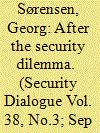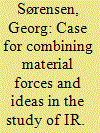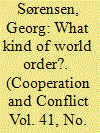| Srl | Item |
| 1 |
ID:
078777


|
|
|
|
|
| Publication |
2007.
|
| Summary/Abstract |
The security dilemma - which raises the imminent risk of war between sovereign states - has always been considered the core issue of international relations. But, the security dilemma is in decline. Interstate war is no longer the supreme concern on the international security agenda. Instead, new dilemmas have emerged, in particular the insecurity dilemma and the associated value dilemma. The insecurity dilemma poses a looming risk of violent domestic conflict in weak states. The related value dilemma concerns the ambiguous content of core liberal values. Negative liberty is autonomy, self-determination and the ability to act unimpeded by others. The promotion of negative liberty calls for non-intervention. Positive liberty is removal of the obstacles that stand in liberty's way: oppression, poverty, ignorance and tyranny. The promotion of positive liberty calls for intervention. Emphasizing negative liberty creates grave problems; emphasizing positive liberty creates grave problems of a different kind. Compromises between intervention and non-intervention must always be troubled and uneasy, because they involve trade-offs between liberal values that are all desirable. There is no clear path to a more liberal world order
|
|
|
|
|
|
|
|
|
|
|
|
|
|
|
|
| 2 |
ID:
080889


|
|
|
|
|
| Publication |
2008.
|
| Summary/Abstract |
Neorealism tends to base itself on a certain, taken-for-granted, view of the material forces in IR, a view which focuses on the relative distribution of capabilities between sovereign states and their consequences in terms of the socialization and competition among states. Social constructivism is preoccupied with the study of ideas, but tends not to question the neorealist view of either socialization or competition or of the material world; the result is that the development and change of how material forces impact with the social world in IR is seriously under-theorized. The present contribution argues in favour of an approach which includes materialist as well as ideational factors; in that sense it advocates `analytical eclecticism'. A rich concept of international structure, which includes materialist as well as ideational factors, is proposed and the consequences of that concept for the analysis of IR are indicated
|
|
|
|
|
|
|
|
|
|
|
|
|
|
|
|
| 3 |
ID:
075657


|
|
|
|
|
| Publication |
2006.
|
| Summary/Abstract |
What kind of world order is now emerging? There are several different suggestions in the debate and the present article is a modest attempt to cut through the confusion. Any comprehensive analysis of order must address four major aspects or dimensions of the phenomenon: (a) the realist concern of the politico-military balance of war; (b) the liberal concern of the make-up of international institutions and the emergence of global governance; (c) the constructivist concern of the realm of ideas and ideology, with a focus on the existence or otherwise of common values on a global scale; and (d) the IPE (International Political Economy) concern of the economic realm of production, finance and distribution. On the basis of this analysis, I define the current order as an interregnum; a new, stable order has not been established but significant elements of the old order remain in place. The consequences of this situation are discussed briefly.
|
|
|
|
|
|
|
|
|
|
|
|
|
|
|
|